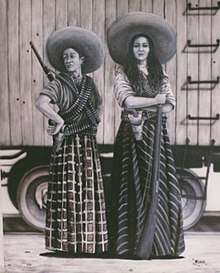La Adelita

"La Adelita" is one of the most famous corridos of the Mexican Revolution. Over the years, it had had many adaptations. This particular version of the ballad was inspired by a Durangan woman who joined the Maderista movement in the early stages of the Revolution who fell in love with Madero. Consequently, this popular icon became the source that documented the role of women in the Mexican Revolution, and gradually became synonymous with the term soldadera, or female soldier, who became a vital force in the revolutionary war efforts due to their participation in the battles against Mexican government forces.[1]
Today, it is argued that Adelita came to be an archetype of a woman warrior in Mexico and a symbol of action and inspiration. Additionally, her name is used to refer to any woman who struggles and fights for her rights. However, the song, the portrait, and the role of its subject have been given different, often conflicting, interpretations. It has also been argued that "'La Adelita' expressed the sensitivity and vulnerability of [army] men, emphasizing the stoicism of the rebellious male soldier as he confront[ed] the prospect of death."[2] Another interpretation of this icon by the feminist scholar María Herrara-Sobek) argue that "Adelita’s bravery and revolutionary spirit are lost to the fatalism and insecurities of male soldiers who […] focused on passion, love and desire as they face[d] combat."[3]
Lyrics
The music of this particular version of "La Adelita" was taken by Isaak Osipovich Dunayevsky, who wrote the songs for one of the best known Soviet comedies, Jolly Fellows (1934).[4] The Soviet composer never mentioned the origins of his song.

|
Spanish En lo alto de la abrupta serranía |
On the heights of a steep mountain range, |
|
Popular entre la tropa era Adelita |
Popular among the troop was Adelita, |
|
Y se oía, que decía, aquel que tanto la quería: |
And it was heard that he who loved her so much said: |
|
Y si Adelita quisiera ser mi esposa |
If Adelita would like to be my wife, |
See also
- Corrido, a type of narrative song found in Mexican folk music
- Soldaderas, female soldiers who served in the Mexican Revolution
References
- ↑ Arrizón, Alicia (1998). "Soldaderas and the Staging of the Mexican Revolution". 42. MIT Press: 90–112.
- ↑ Arrizón, Alicia (1998). "Soldaderas and the Staging of the Mexican Revolution". 42. MIT Press: 91.
- ↑ Arrizón, Alicia (1998). "Soldaderas and the Staging of the Mexican Revolution". 42. MIT Press: 91.
- ↑ "Леонид Утёсов и др. Марш весёлых ребят".
Alicia Arrizón, “Soldaderas and the Staging of the Mexican Revolution,” MIT Press, 1998, Vol. 42, 90-112.